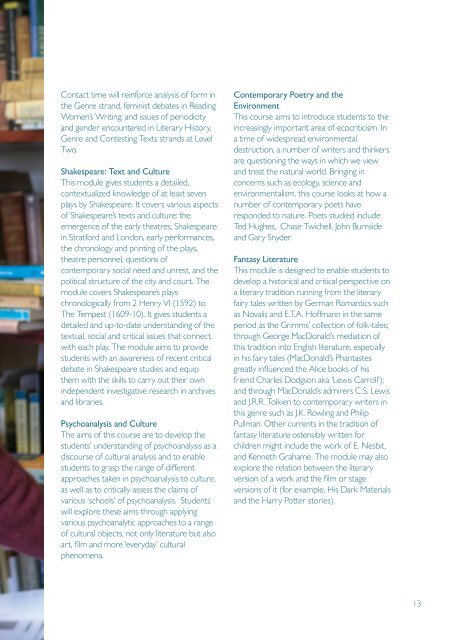ba-hons-english-creative-writing
ba-hons-english-creative-writing
ba-hons-english-creative-writing
Create successful ePaper yourself
Turn your PDF publications into a flip-book with our unique Google optimized e-Paper software.
Contact time will reinforce analysis of form in<br />
the Genre strand, feminist de<strong>ba</strong>tes in Reading<br />
Women’s Writing, and issues of periodicity<br />
and gender encountered in Literary History,<br />
Genre and Contesting Texts strands at Level<br />
Two.<br />
Shakespeare: Text and Culture<br />
This module gives students a detailed,<br />
contextualized knowledge of at least seven<br />
plays by Shakespeare. It covers various aspects<br />
of Shakespeare’s texts and culture: the<br />
emergence of the early theatres, Shakespeare<br />
in Stratford and London, early performances,<br />
the chronology and printing of the plays,<br />
theatre personnel, questions of<br />
contemporary social need and unrest, and the<br />
political structure of the city and court. The<br />
module covers Shakespeare’s plays<br />
chronologically from 2 Henry VI (1592) to<br />
The Tempest (1609-10). It gives students a<br />
detailed and up-to-date understanding of the<br />
textual, social and critical issues that connect<br />
with each play. The module aims to provide<br />
students with an awareness of recent critical<br />
de<strong>ba</strong>te in Shakespeare studies and equip<br />
them with the skills to carry out their own<br />
independent investigative research in archives<br />
and libraries.<br />
Psychoanalysis and Culture<br />
The aims of this course are to develop the<br />
students’ understanding of psychoanalysis as a<br />
discourse of cultural analysis and to enable<br />
students to grasp the range of different<br />
approaches taken in psychoanalysis to culture,<br />
as well as to critically assess the claims of<br />
various ‘schools’ of psychoanalysis. Students<br />
will explore these aims through applying<br />
various psychoanalytic approaches to a range<br />
of cultural objects, not only literature but also<br />
art, film and more ‘everyday’ cultural<br />
phenomena.<br />
Contemporary Poetry and the<br />
Environment<br />
This course aims to introduce students to the<br />
increasingly important area of ecocriticism. In<br />
a time of widespread environmental<br />
destruction, a number of writers and thinkers<br />
are questioning the ways in which we view<br />
and treat the natural world. Bringing in<br />
concerns such as ecology, science and<br />
environmentalism, this course looks at how a<br />
number of contemporary poets have<br />
responded to nature. Poets studied include<br />
Ted Hughes, Chase Twichell, John Burnside<br />
and Gary Snyder.<br />
Fantasy Literature<br />
This module is designed to enable students to<br />
develop a historical and critical perspective on<br />
a literary tradition running from the literary<br />
fairy tales written by German Romantics such<br />
as Novalis and E.T.A. Hoffmann in the same<br />
period as the Grimms’ collection of folk-tales;<br />
through George MacDonald’s mediation of<br />
this tradition into English literature, especially<br />
in his fairy tales (MacDonald’s Phantastes<br />
greatly influenced the Alice books of his<br />
friend Charles Dodgson aka ‘Lewis Carroll’);<br />
and through MacDonald’s admirers C.S. Lewis<br />
and J.R.R. Tolkien to contemporary writers in<br />
this genre such as J.K. Rowling and Philip<br />
Pullman. Other currents in the tradition of<br />
fantasy literature ostensibly written for<br />
children might include the work of E. Nesbit,<br />
and Kenneth Grahame. The module may also<br />
explore the relation between the literary<br />
version of a work and the film or stage<br />
versions of it (for example, His Dark Materials<br />
and the Harry Potter stories).<br />
13


